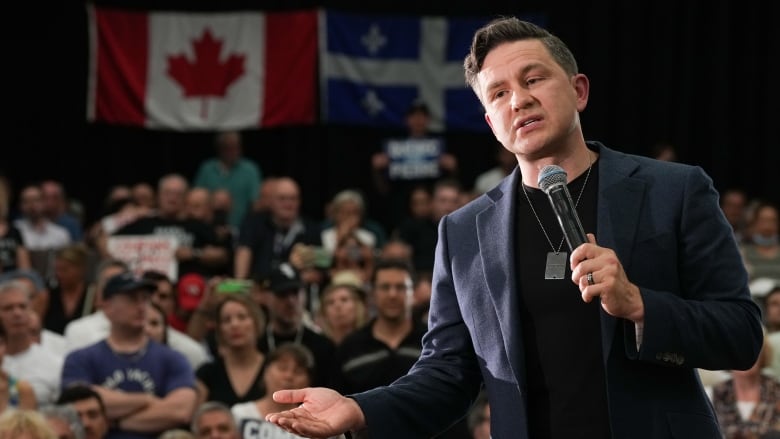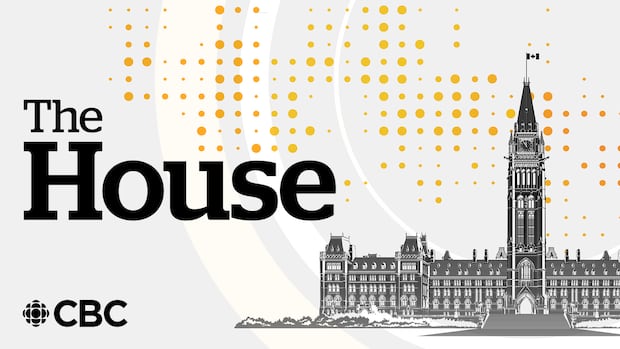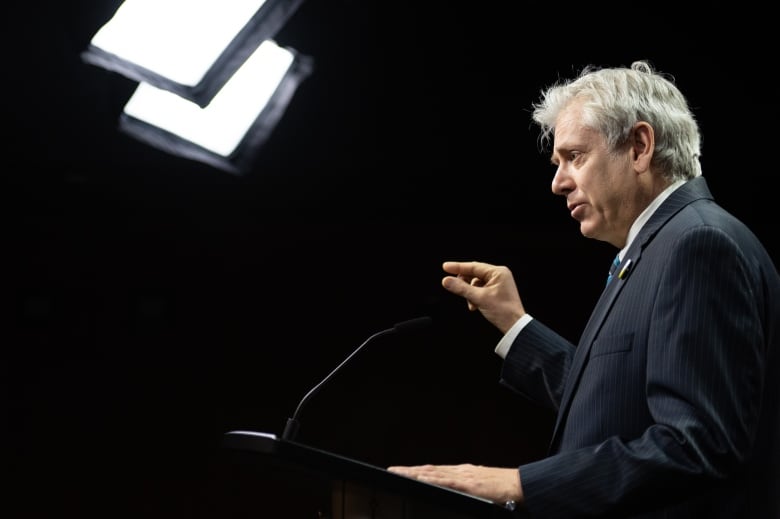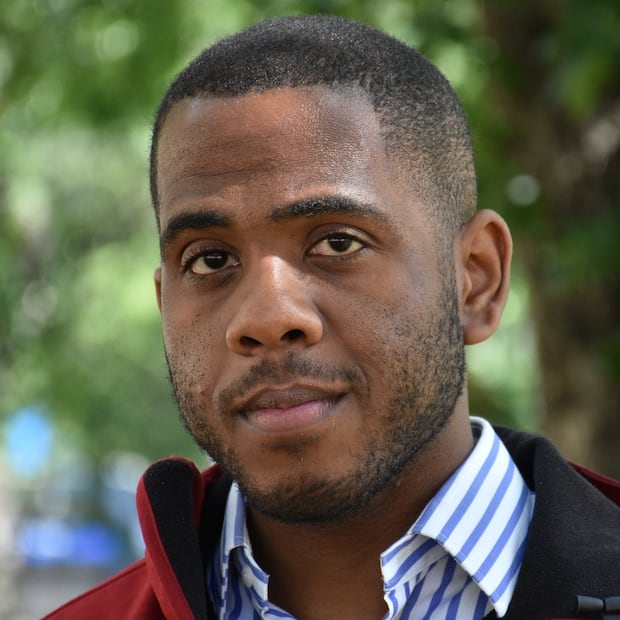Bot campaign backing Pierre Poilievre looks the work of an amateur, experts say | CBC News
Bot campaign backing Pierre Poilievre looks the work of an amateur, experts say | CBC News
A rapid assessment of the suspected bot campaign associated with Conservative Leader Pierre Poilievre’s recent speaking event in northern Ontario was likely the work of an amateur.
Social Media Lab calls the bot campaign a 'crude and amateurish exercise'

Conservative Leader Pierre Poilievre speaks during a rally in Montreal on Wednesday, June 19, 2024. (THE CANADIAN PRESS/Christinne Muschi)
Academics who study social media say a suspected bot campaign associated with Conservative Leader Pierre Poilievre's recent speaking event in northern Ontario likely was the work of an amateur.
A rapid analysis conducted by Toronto Metropolitan University's Social Media Lab (SML) concluded the bot campaign does not have the fingerprints of a sophisticated actor, but didn't say who might have been behind it.
In July, the social media platform X was inundated with posts following Poilievre's tour of Northern Ontario.
These posts claimed to be from people who attended Poilievre's event in Kirkland Lake, Ont. They were actually generated by accounts in Russia, France and other places, and many of them had similar messaging.
Academics at SML manually sifted through an estimated 200 bot accounts associated with the campaign. The lab said some of the accounts were created within the last two months.
"To confirm that this wasn't part of a broader influence campaign, we conducted a cursory scan of other social media platforms. Our scan didn't find any similar campaign, further reinforcing our hunch that this was likely done by an amateur with limited resources," said SML in an online post.
"If this was an attempt at influencing voters in Canada, it's a crude and amateurish exercise and doesn't hold a candle to other known influence campaigns."
SML compared the northern tour bot campaign to a Chinese government-linked "spamouflage campaign" in 2023.
In October, federal officials said the Chinese government likely was behind a "spamouflage" disinformation campaign targeting Prime Minister Justin Trudeau, Poilievre and other MPs in August and September of 2023.
Global Affairs Canada's Rapid Response Mechanism (RRM), set up to monitor foreign state-sponsored disinformation efforts, said the campaign was "connected to the People's Republic of China" and was meant to curb criticism of the communist regime.
LISTEN | What's behind the alleged Kirkland Lake bot campaign?

The House9:55Bots buzzing with energy!
After a series of strangely similar tweets appeared on X from social media accounts purporting to be “buzzing with energy” after a Pierre Poilievre rally, ProPublica’s Craig Silverman explains who stands to gain when bots push out political messaging.
The NDP called on the elections commissioner to investigate what was behind the army of bots supporting Poilievre.
The Conservative Party of Canada has denied any role in the bot campaign, a position it reiterated again on Friday.
"As we always said, the CPC had nothing to do with this. The Conservative Party does not use bots. It would have been nice if someone had done this research before blindly repeating baseless accusations from the Liberals and NDP," said Sarah Fischer, director of communications for the Conservative Party of Canada.

NDP MP for Timmins-James Bay Charlie Angus speaks during a news conference on Parliament Hill in Ottawa on Feb. 7, 2023. (Spencer Colby/The Canadian Press)
The NDP also called for the elections commissioner to get involved.
"We need more than speculation on the Kirkland Lake bot scandal. Canadians have a right to know that democratic engagement is open, transparent and free from manipulation," the NDP's Charlie Angus said in a media statement.
"This is why elections Canada needs to investigate and lay out clear ground rules."
Angus, the MP for Timmins—James Bay, represents the area where Poilievre held the rally.
WATCH: NDP raising 'legitimate' questions about bot farms, Holland says

NDP raising 'fair and legitimate' questions about bot farms, Holland says
Health Minister Mark Holland, speaking after Conservatives rejected an allegation that the party used bot farms to post online content, says there are 'a lot of questions that have to be asked' and encouraged people to be circumspect about what they see online.
Researchers are calling the Kirkland Lake bot campaign an example of a "copypasta" attack. The term is derived from copy-and-paste — selecting a piece of text and copying it elsewhere.
In a copypasta attack, a block of text is copied and pasted widely, often for humorous or sarcastic purposes. According to a post from the Canadian Digital Media Research Network, it's frequently used to generate memes or to confuse people who don't recognize it as a joke.
The Canadian Digital Media Research Network (CDRN) is a new organization that gathers social media researchers and experts from around Canada who monitor the online world.
McGill University's Media Ecosystem Observatory and the University of Toronto administer the CDRN. The federal government has committed to investing $5.5 million in the network over the next several years — one of a series of measures the federal government announced in 2023 to combat the threat of foreign interference, misinformation and disinformation.
The CDRN's Jennie Phillips said the network is treating this as both a minor incident and a learning experience.
"It's actually quite a valuable case to study," she said. "This is like a flag of what can come in, especially during elections. So there's a lot that can be learned and understood around these sorts of things."
She said the Kirkland Lake incident represents the first time the network has activated its rapid response team. In addition to the recent real-time report released by its partner, Toronto Metropolitan University's Social Media Lab (SML), the network is committed to releasing further updates on its network website.
ABOUT THE AUTHOR

David Thurton is a senior reporter in CBC's Parliamentary Bureau. He covers daily politics in the nation’s capital and specializes in environment and energy policy. Born in Canada but raised in Trinidad and Tobago, he’s moved around more times than he can count. He’s worked for CBC in several provinces and territories, including Alberta and the Northwest Territories. He can be reached at [email protected]
With files from Catharine Tunney